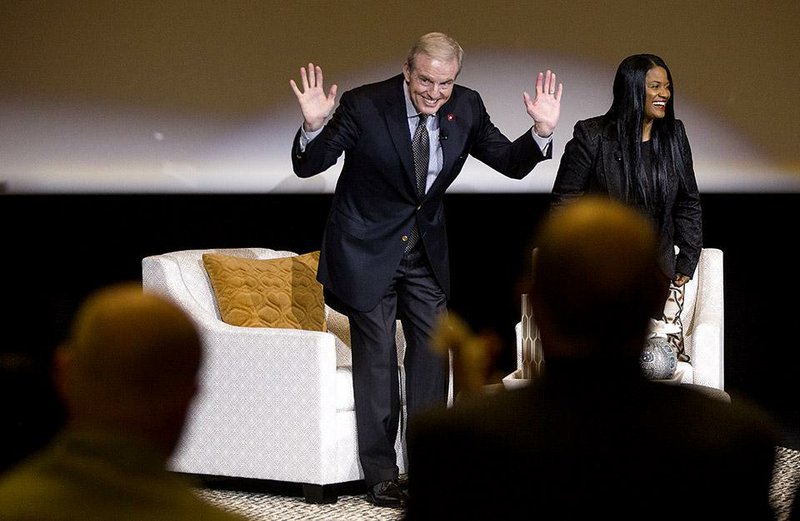Correction: Former Gov. Jim Guy Tucker said during an interview Sunday that if he had been able to serve longer as governor, he would have pursued changes in tax policy. “It concerns me that both nationally and locally we tax labor at a higher rate than capital investments, and I think capital investments ought to get good treatment — but labor, whether it is physical or mental, I do not think should be taxed at a punitive tax rate,” he said. “…That may lead you to have to look at some other taxes.” This article failed to clearly state his idea on taxes.
Former Gov. Jim Guy Tucker said that if he were in office now, he would strengthen and renew access to health care -- an important topic for him because of his own medical problems.
Speaking Sunday as part of the Conversations with Arkansas Governors interview series, Tucker said he would support the current program, referring to the state's private option, which takes advantage of federal Medicaid dollars made available under the Patient Protection and Affordable Care Act.
"It's vitally important for us now, and I'm saying this as one who is alive today only due to the miracle of modern medical science," he told a small crowd at Ron Robinson Theater in Little Rock. "Letting people die or suffer a dreadful life because of illness because they don't happen to have the money to pay for extensive care -- that just goes against my religion, my political philosophy."
Tucker, a Democrat who served from 1992 until his resignation in 1996, was the second former governor to be interviewed as part of the series in which governors share their experiences from the position. Former Gov. Mike Huckabee was interviewed last month.
Tucker, now 71, talked at length about his health problems, adding that he's felt younger in the years since his liver transplant than he did for much of his adult life.
At age 18 and in his first year at Harvard, Tucker was diagnosed with ulcerative colitis, an inflammatory bowel disease. About 20 years later, doctors diagnosed a condition called primary sclerosing cholangitis, which attacks the liver. Because of the diseases, Tucker's colon was removed in 1988, and he underwent a liver transplant in 1996.
What he called one of the "most critical" actions he took as governor centered on health care.
Just weeks after being sworn in, Tucker called a special session when Arkansas ran out of money to fund Medicaid services. As a result of the session, the state created a Medicaid trust fund and a tax to fund it.
"Now, a number of taxes pay into that trust fund," Tucker said. "That's how we protect and ensure we have matching money for all the people on Medicaid. With the new health care law, that trust fund is even more important."
Tucker resigned in July 1996 after being convicted of conspiracy and mail fraud in connection with the Whitewater investigations. He briefly rescinded his resignation just before Huckabee, then lieutenant governor, was sworn in -- a move for which Tucker said he has "always been sorry."
Frederick Gentry, who joined Tucker's re-election campaign in 1994, was in attendance Sunday. During the question-and-answer portion of the event, Gentry told the former governor that he was in the gallery at the House of Representatives to see Huckabee's inauguration in 1996, and he asked Tucker how that day was for him.
"It was a unique time in the history of the state," Gentry said. "It was weird for everybody. I remember it was late starting, and leadership in the House and Senate were trying to figure out what was happening."
Tucker answered by saying he had just discovered that a juror who heard his case had married a former prison inmate whom Tucker had denied executive clemency, and he wanted the resignation to be deferred until there was a hearing.
"However, that being said, I quickly realized first, how impaired I was. I was within a few months of my liver transplant," Tucker said. "And second, that regardless of what the answer was on that, I had to stop serving as governor at that point. I've always been sorry I ever got to that point, and I'm still sorry about it today. It was an awful, awful day. It was an awful time."
If he were able to serve his entire term -- and maybe even another one -- Tucker said he would have pursued a list of things, including updating and changing the state constitution, expanding the mandatory summer school program he had helped to authorize, and addressing the state's policies to lower the tax on labor and to increase taxes on capital investments.
Talk of boosting the state's education system was sprinkled throughout Sunday's conversation, with Tucker calling for the expansion of pre-kindergarten and increased broadband access for all schools.
When asked what legacy he left for the state, Tucker said, "I don't know that there's any particular legacy I passed on."
"I tried very hard to do a good job," he continued. "I tried not to ignore issues that I believed were very important, even if it was politically unpopular. By the time I reached the governor's office, I really thought my tenure on Earth was probably going to be very short, so I had the blessing of not having to worry about that a whole lot. I was happy to do what I thought was the right thing, and if I made mistakes, I apologize."
Metro on 11/24/2014
